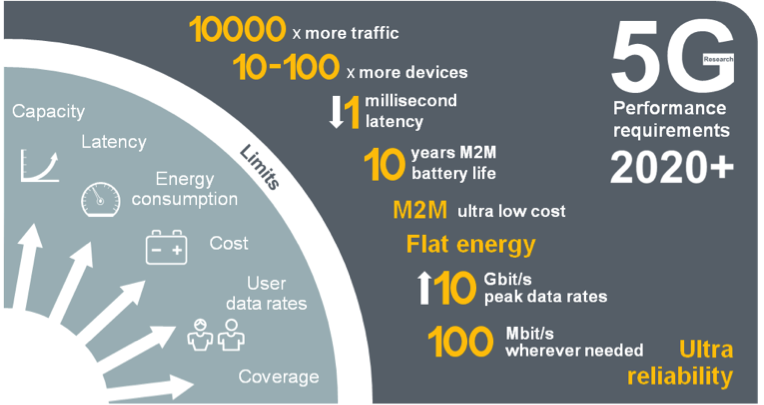Everyone is excited about 5G. Why? Because 5G networks will bring super fast mobile internet, better optimized networks, open up many novel use cases for mobile data, and capitalize on the ability to transfer large amounts of data extremely quickly. As wireless technology undergoes a transitional phase from 4G and LTE to 5G, these benefits are only a tip of the iceberg of what the 5th generation of the next wireless mobile standard promises.
In countries like the US, the UK, China, South Korea, and Japan, the rollout will start over the next 2 years. Fixed Wireless Access (FWA), the Internet of Things (IoT), big data, self-driven cars, drones — the benefits of 5G seem endless. In this article, we’ll explore the expectations and benefits of this next iteration in the series of mobile networks. We will also draw a comparison between 5G and satellite internet.
Expectations
Though 5G isn’t expected to see a widespread rollout just yet, many companies have already put investment in top gear in a bid to prepare ahead for the upcoming wireless network. In various parts of the world, trial 5G networks are already being designed. In the US, Verizon is starting to offer 5G internet in select cities (including Houston, Indianapolis, Los Angeles, and Sacramento) as of October 1, 2018.

As the buzz around this new network builds up, what can you expect? As stated in a 5G white paper written by the Next Generation Mobile Network, 5G connections have to be based on enhanced services, user experience, business models, system performance as well as management and operations. Furthermore, according to GSMA (an acronym for Group Special Mobile Association), a connection can be called 5G if it satisfies most of these 8 requirements:
- 1 – 10 gigabit per second connections made to endpoints located in the field.
- 1000x (one-thousand fold) bandwidth for a unit area.
- 1ms (millisecond) end-to-end round-trip delay.
- 10 – 100x number of devices with connection.
- Network coverage of 100%.
- Availability of 99.999%.
- 90% decrease in energy usage by network.
- As much as 10-year battery life for low power devices.
In a report compiled by PSB Research that did a survey involving more than 3,500 participants such as analysts, tech enthusiasts, and others; it was discovered that due to 5G:
- 87% of respondents anticipate the emergence of new industries.
- 91% expect the invention of new products as well as services, not in existence as of yet.
- 85% expect the 5G connection to increase global competition among companies.
- 82% expect the growth of small businesses and stiffer global competition.
- 89% of the people surveyed expect greater productivity.
Benefits
Greater speeds: This new wireless network mobile standard will, no doubt, be much faster than its predecessors, with some analysts stating it may be as much as 100 times faster than the current 4G connections. To be more specific, 5G could provide speeds that are up to 10Gb per sec. For example, with this connection, you could download a full HD movie in less than 10 secs., compared with 10 minutes using a 4G connection.
More flexibility: 5G networks will offer flexibility. Network slicing gives room for a physical network to be split into many virtual networks, allowing the operator to employ the appropriate slice, based on the needs of the use case.
Self-driving cars: Though corporations such as Google, Uber, and the likes are making significant investments in autonomous cars currently, a lot of people in the industry do not feel that a fully functional self-driven vehicle is possible without the use of a 5G connection. The instantly responsive connection and widespread network coverage imply that such cars will be able to employ 5G for communicating with talk other cars as well as sensors, designed around the city such as gas stations, street lamps, etc. But 5G is not all about autonomous cars; it also has applications in urban design and technology.
Virtual reality: This concept was very trendy at the Mobile World Congress held in 2016. However, the technology witnessed a decline in popularity in 2017. 5G networks could enhance the VR experience as it allows you to chat in real time using live-streaming virtual worlds. There could even be a re-emergence of game arcades, which is centered on VR.
There are many other benefits of 5G networks. The ones highlighted are only a handful of them.
5G vs Satellite Internet
When exploring the features of 5G networks in comparison with those of satellite internet, one can visualize what the integration of the two promises. The market is demanding unlimited data plan, blistering internet speeds, and uninterrupted service. Furthermore, services need to be available in all places (whether indoors or outdoors), and need to be reliable and consistent.
Satellite technology can enhance 5G in the following areas:
- Offering support to service delivery in areas that are underserved or unserved.
- Allowing the availability of networks moving platforms, the likes of in-transit passengers, buses, vehicles, ships, aircraft, and high-speed trains and other areas.
Final thoughts
While widespread 5G networks aren’t here yet, it’s seeming more and more likely they will be soon. I’d imagine if the rollout of 5G in the select cities in Verizon’s trial phase goes well, we will see 5G available in more cities and locations across the US. The move to 5G will be huge for both businesses and consumers.
